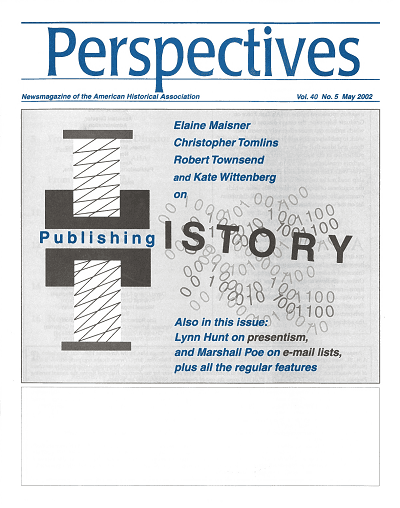Riff Raff
Platinum Member
- Aug 13, 2022
- 630
- 469
- 483
Historians lament our increasing tendency to interpret the past through the lens of the present. History is more than “short-term . . . identity politics defined by present concerns,” said Lynn Hunt, past president of the American Historical Association, twenty years ago. That statement was recalled by the present president of the association, James Sweet, a scholar of Africa, in an article published last month in the association’s magazine, entitled "Is History History?"
In this era of Twitter, Obama and Trump, the discipline has become more focused on the 20th and 21st centuries, historical analyses within an increasingly contemporary containment. Interpretations of the past collapse into contemporary debates, leaving little room for deeper interpretations.
This trend toward presentism is lurching history in this direction. The past is being viewed through the prism of contemporary social justice issues—race, gender, sexuality, nationalism, capitalism. This new history often ignores the values and morals of people in their own times, as well as change over time, neutralizing the expertise of historians. Political relevance, facilitated by social and other media, encourages a predictable sameness of the present in the past. This sameness is ahistorical.
American history suffuses everyday life as presentism. We suffer from an overabundance of history as anachronistic data points for the articulation of competing politics, not as method or analysis.
The consequences of this new history are everywhere. Sweet traveled to Ghana for two months this summer to research and write a critical response to The 1619 Project: A New Origin Story by Nikole Hannah-Jones. The story is a best-selling book that sits at the center of current controversies over how to teach American history. The project is powerful and effective journalism, but is it history?
Sweet, the Africa scholar now president of the American Historical Association, thought of it as black nationalism with a call for "reparations." A political project but not a work of history. Ironically, a professional historians’ engagement with the work seemed to lend it historical legitimacy. Then the Times, in partnership with the Pulitzer Center, developed a secondary school curriculum around the project. Local school boards protested characterizations of Washington, Jefferson, and Madison as unpatriotic owners of “forced labor camps.” That black-authored description of the Founders was criticized as racially divisive. History was a zero-sum game of heroes and villains viewed through the prism of black tribalism, not an analysis of people’s ideas in their own time nor a process of change over time.
Sweet and his family traveled to a small seaside fishing village in Ghana, to Elmina, home to one of the largest Atlantic slave-trading depots in West Africa. The guide gave a well-rehearsed tour geared toward African Americans. American influence was everywhere, from memorial plaques to wreaths and flowers left on the floors of the castle’s dungeons. Arguably, Elmina Castle is now as much an African American shrine as a Ghanaian archaeological or historical site. Sweet could only imagine the affirmation and bonding experienced by African Americans—through the memorialization of ancestors lost to slavery at Elmina Castle, but also through the demand for reparations in The 1619 Project.
Yet as a historian of Africa and the African diaspora, Sweet was troubled by the historical erasures and narrow politics that those narratives convey. Less than one percent of the Africans passing through Elmina arrived in North America. The great majority went to Brazil and the Caribbean. Should the guide’s story differ for a tour with no African Americans? Likewise, would The 1619 Project tell a different history if it took into consideration that the shipboard kin of Jamestown’s “20 and odd” Africans also went to Mexico, Jamaica, and Bermuda? These are questions of historical interpretation, but present-day political ones follow.
The Elmina tour guide claimed that “Ghanaians” sent their “servants” into chattel slavery unknowingly. The guide made no reference to warfare or Indigenous slavery, histories that interrupt assumptions of ancestral connection between modern-day Ghanaians and visitors from the diaspora. Similarly, the forthcoming film The Woman King seems to suggest that Dahomey’s female warriors and King Ghezo fought the European slave trade. In fact, they promoted it. Historically accurate rendering of Asante or Dahomean greed and enslavement apparently contradict modern-day political imperatives.
Hollywood need not adhere to historians’ methods any more than journalists or tour guides, but bad history yields bad politics. The erasure of slave-trading African empires is a false political narrative. If history is only those stories from the past that confirm current political positions, all manner of political hacks can claim historical expertise.
Historians engage in research methods and interpretive approaches incompatible with solving modern-day legal, political, or economic questions. History should not be the primary measure for adjudicating contemporary political issues.
Professional historians would do well to pay attention. The present has been creeping up on that discipline for a long time. Doing history with integrity requires them to interpret elements of the past not through the optics of the present but within the worlds of our historical actors. Historical questions often emanate out of present concerns, but the past interrupts, challenges, and contradicts the present in unpredictable ways. History is not a tool for the articulation of an ideal imagined future. Rather, it is a way to study the messy, uneven process of change over time. When history is shaped to justify rather than inform contemporary political positions, the discipline is not only undermined but its very integrity is threatened.
In this era of Twitter, Obama and Trump, the discipline has become more focused on the 20th and 21st centuries, historical analyses within an increasingly contemporary containment. Interpretations of the past collapse into contemporary debates, leaving little room for deeper interpretations.
This trend toward presentism is lurching history in this direction. The past is being viewed through the prism of contemporary social justice issues—race, gender, sexuality, nationalism, capitalism. This new history often ignores the values and morals of people in their own times, as well as change over time, neutralizing the expertise of historians. Political relevance, facilitated by social and other media, encourages a predictable sameness of the present in the past. This sameness is ahistorical.
American history suffuses everyday life as presentism. We suffer from an overabundance of history as anachronistic data points for the articulation of competing politics, not as method or analysis.
The consequences of this new history are everywhere. Sweet traveled to Ghana for two months this summer to research and write a critical response to The 1619 Project: A New Origin Story by Nikole Hannah-Jones. The story is a best-selling book that sits at the center of current controversies over how to teach American history. The project is powerful and effective journalism, but is it history?
Sweet, the Africa scholar now president of the American Historical Association, thought of it as black nationalism with a call for "reparations." A political project but not a work of history. Ironically, a professional historians’ engagement with the work seemed to lend it historical legitimacy. Then the Times, in partnership with the Pulitzer Center, developed a secondary school curriculum around the project. Local school boards protested characterizations of Washington, Jefferson, and Madison as unpatriotic owners of “forced labor camps.” That black-authored description of the Founders was criticized as racially divisive. History was a zero-sum game of heroes and villains viewed through the prism of black tribalism, not an analysis of people’s ideas in their own time nor a process of change over time.
Sweet and his family traveled to a small seaside fishing village in Ghana, to Elmina, home to one of the largest Atlantic slave-trading depots in West Africa. The guide gave a well-rehearsed tour geared toward African Americans. American influence was everywhere, from memorial plaques to wreaths and flowers left on the floors of the castle’s dungeons. Arguably, Elmina Castle is now as much an African American shrine as a Ghanaian archaeological or historical site. Sweet could only imagine the affirmation and bonding experienced by African Americans—through the memorialization of ancestors lost to slavery at Elmina Castle, but also through the demand for reparations in The 1619 Project.
Yet as a historian of Africa and the African diaspora, Sweet was troubled by the historical erasures and narrow politics that those narratives convey. Less than one percent of the Africans passing through Elmina arrived in North America. The great majority went to Brazil and the Caribbean. Should the guide’s story differ for a tour with no African Americans? Likewise, would The 1619 Project tell a different history if it took into consideration that the shipboard kin of Jamestown’s “20 and odd” Africans also went to Mexico, Jamaica, and Bermuda? These are questions of historical interpretation, but present-day political ones follow.
The Elmina tour guide claimed that “Ghanaians” sent their “servants” into chattel slavery unknowingly. The guide made no reference to warfare or Indigenous slavery, histories that interrupt assumptions of ancestral connection between modern-day Ghanaians and visitors from the diaspora. Similarly, the forthcoming film The Woman King seems to suggest that Dahomey’s female warriors and King Ghezo fought the European slave trade. In fact, they promoted it. Historically accurate rendering of Asante or Dahomean greed and enslavement apparently contradict modern-day political imperatives.
Hollywood need not adhere to historians’ methods any more than journalists or tour guides, but bad history yields bad politics. The erasure of slave-trading African empires is a false political narrative. If history is only those stories from the past that confirm current political positions, all manner of political hacks can claim historical expertise.
Historians engage in research methods and interpretive approaches incompatible with solving modern-day legal, political, or economic questions. History should not be the primary measure for adjudicating contemporary political issues.
Professional historians would do well to pay attention. The present has been creeping up on that discipline for a long time. Doing history with integrity requires them to interpret elements of the past not through the optics of the present but within the worlds of our historical actors. Historical questions often emanate out of present concerns, but the past interrupts, challenges, and contradicts the present in unpredictable ways. History is not a tool for the articulation of an ideal imagined future. Rather, it is a way to study the messy, uneven process of change over time. When history is shaped to justify rather than inform contemporary political positions, the discipline is not only undermined but its very integrity is threatened.
Last edited:


